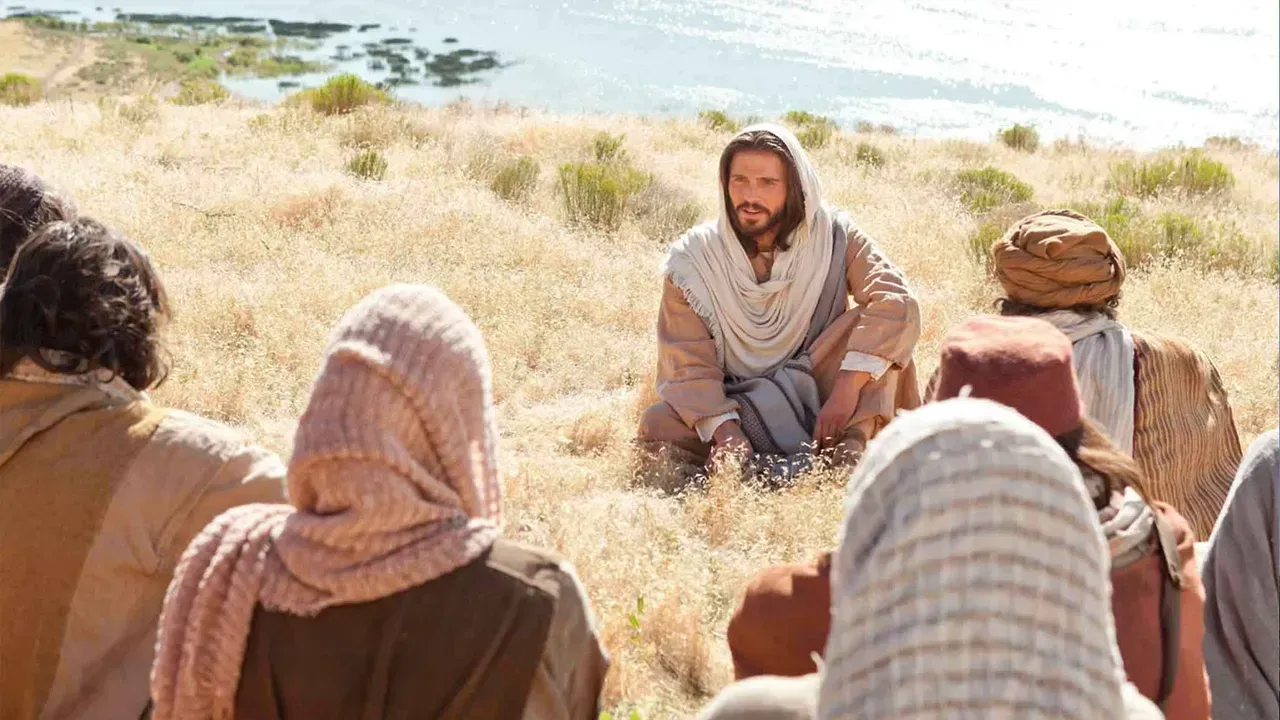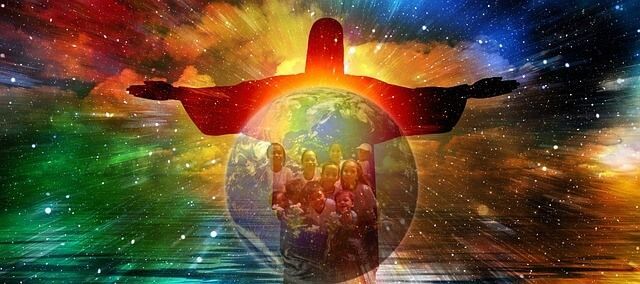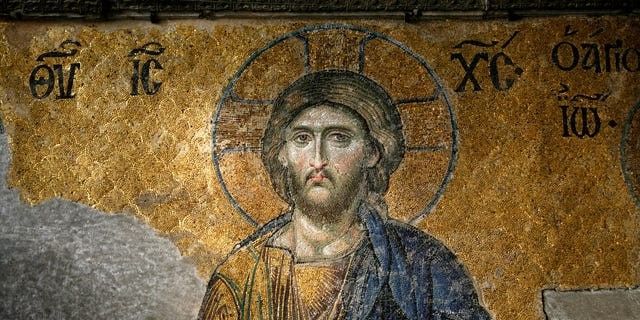
WHAT was Jesus talking about? Last Sunday’s Gospel tells us that Jesus went all over Galilee preaching “Repent, for the kingdom of Heaven is at hand” . Do we know what he meant by “repent”? English has a narrow definition of the word 'REPENT'. For us, it focuses on human sin. It is about having remorse for a specific sin which we have to confess and turn away from; it leads to a call for God’s mercy. The Gospel of Matthew was written in Greek. Here Jesus uses the word “metanoia”, which means “to turn your life in another direction”. Here the stress is not on what we turn from but where or who we turn to. It is intimately directed to the God of mercy, compassion, faithful love and grace. So Christian repentance is primarily about opening our hearts to God’s love. This January we begin Year A in Ordinary Time. It is a time of new beginnings. The Church, in choosing these readings on the 3 rd Sunday of Ordinary Time, is calling us to make the New Year’s resolution of turning more deeply to the God of love. It is a time to ask some questions. Am I coasting along - not depending much on the loving God? Am I comfortable as I am? Has my once radical ambition to follow Jesus like the fishermen who leave their boats and nets grown cold? Do I need to hear the divine call afresh? It is no use embarking with the Church on a new year of grace unless I am determined to open my heart more deeply to the infinite love which is calling at the deepest level of my being. In less than three weeks, Lent will start. Am I going to leave thinking about it till the last minute? Holy Spirit kindle in us the fire of your love!

LOVE v WILL POWER For years I have heard spiritual guides saying that it is our wills that are crucial in the prayer of the heart. I have to admit that I have found it difficult to make sense of this, because it sounds like muscular Christianity which I have found inadequate. I imbibed a strong moralising religion as a child, which meant learning what was right and willing myself to do it – this was especially reinforced by the image of a fearsome God who was keeping the score. The result was a sense of failure combined with frequent resolutions to do better. I know that was not true religion, which is about relating to the God who is love. What I was practicing was a throwback to Old Testament keeping of the law. I think that is what Jesus was talking about when he described John the Baptist as the greatest man born of woman, but added ‘yet the least in the kingdom of heaven is greater than he is’ . He said: ‘Since John the Baptist came, up to this present time, the kingdom of heaven has been subjected to violence and the violent are taking it by storm’ . (Matthew 11, 11). Muscular Christianity with its stress on will power uses violence against self and even against others to take the kingdom of heaven by storm. So why do the greatest spiritual guides keep saying that the will is central? A clue lies in The Catechism of the Catholic Church’s chapter on prayer (paragraph 2563). The explanation begins with the heart: “The heart is the dwelling-place where I live. According to the Semitic (Jewish) or Biblical expression, the heart is the place ‘to which I withdraw.’ The heart is our hidden centre, beyond the grasp of our reason and of other people; only the Spirit of God can fathom the human heart and know it fully.” The Catechism’s explanation then shifts the focuses to the heart’s movement and actions beyond itself: “The heart is the place of decision , deeper than our psychic drives. It is the place of truth, where we choose life or death. It is the place of encounter, because as images of God we live through relationship: it is the place of covenant” (my underlining). I find the words ‘decision’ and ‘choose’ more helpful than ‘will’. As I spend time in silent prayer seeking the face of God, with the conscious attempt to love him and be loved by him, it is the constant renewing of the decision and choice which gradually solidifies an attitude of love in my heart. Much of the time, there is no feeling or understanding of this living relationship, but, as time goes on, I am aware that that relationship is an attitude developing in my heart. That awareness rises up from my heart to my mind more and more throughout the day and night. It is like a catch of a tune springing up in the mind. But the word ‘will’ or 'will power' certainly describes the strength needed when there is temptation. I find that it is easier to resist temptation when I am aware of the Father’s love and Jesus’ closeness. It is when these are obscured that my will must operate most strongly. Usually it is not a matter of willing to do something, but rather a tenacious clinging on in the dark to the hand of God. That takes grit, in which I am often lacking, but as the relationship grows I expect my will to grow stronger. WHAT IS THE USE OF TEMPTATION? We might ask: what does temptation have to do with contemplation? Temptation is never far away from one who contemplates. The Evil One knows only too well what power for good flows from the lovers of God. He hates contemplation and tries to disrupt it whenever he can. Thankfully, God shields his lovers much of the time, but at others he permits us to be tempted. It is not that he is abandoning us then, but he is turning the Devils weapons back on his own head. Each time we overcome temptation with the help of God's grace, not only is the Devil weakened, but also our own inner self grows stronger. It is in that struggle, that we are tested and purified like gold in a furnace. When undergoing temptation it is important to remember four basic Catholic teachings. God will never allow us to be tempted beyond our strength. But often we will not appreciate what strength we have with the aid of God's grace until after struggle is over. All temptations eventually pass. Temptation is not sin. Sin is where we willingly indulge a temptation and welcome it into our souls. Then it restricts our capacity to experience God's love. In that state of deprivation we allow evil to become stronger in ourselves and the whole world. Temptations arise from virtues that are wounded and twisted. Anger, for instance, is a God-given power of our soul to remove evil with extraordinary force. When anger is diseased, that force is used to harm and hurt. The saints and spiritual teachers mean something much deeper than 'will power' when they use the word 'will'. We shall consider that in Chapter 12 in this series 'Prayer of the heart'. QUESTION How are you finding my thoughts on the prayer of the heart/contemplation? I am sure I myself only see a small part of this deepest activity of our spirit. Would you care to add something of your own thoughts and experience? Use the 'comment on this article' button below.
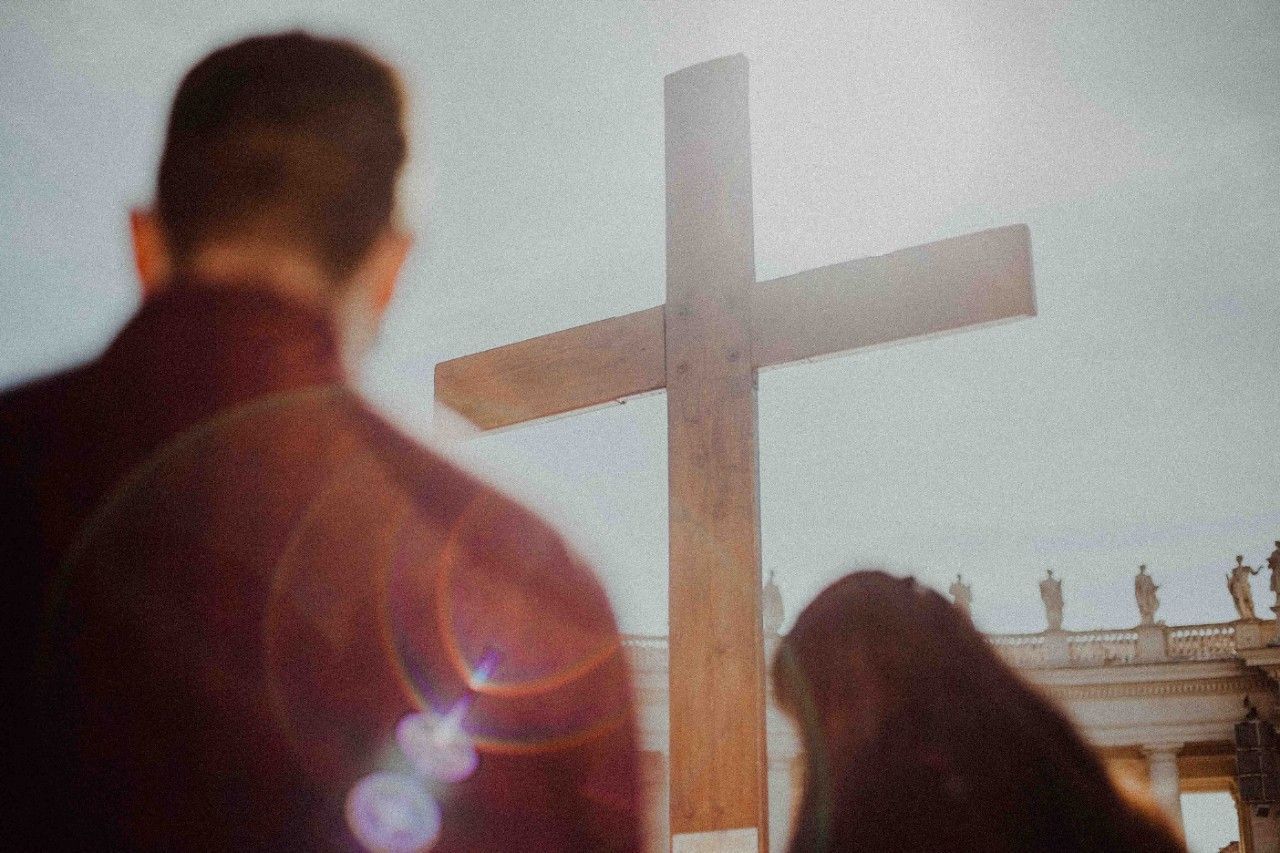
God gradually develops his salvation in stages. Let's take a moment to consider how he does this. His people On Easter night, the risen Jesus entered the upper room to the amazement of his people, and he eagerly breathed the Holy Spirit upon them. That moment was the culmination of 2000 years of God’s preparation for the renewal of creation. He had centred this preparation stage on his chosen people, Israel. Long ago, God took a tribe of slaves out of oppression in Egypt. Then he led them through the desert for 40 years in which these wild spirits gradually made a covenant with him, because they saw his mighty deeds. It was his “right hand” alone that brought them victories. Remember how Joshua and Hur held up Moses’ arms in prayer to bring them victory over the Amalekites? (Exodus 17: 8-12) The walls of Jericho tumbled down as they processed around them just praising God. (Joshua 6: 1-20) He led them to conquer city after city, becoming skilful warriors. Truly, as Psalm 44 says, it was by God’s “right hand and arm” that they gained victories, and it was “because he loved them” . That was an amazing time. Then they settled and cultivated the land, became farmers and gradually their civilization developed; they started recording their history in books. But it was also a long period of centuries in which he stopped feeding them like babies – they had to grow up. They struggled to abandon their own tendency to invent their own gods, and slowly learned to deal with the real God in the way he demanded. All their worst vices came out and they had terrible times of crisis, but after two thousand years, they were at the stage where there were sufficient of them ready to receive the Messiah. After Jesus had ascended to Heaven, God’s chosen people assumed their new name “Christians”. It was time to bring all people into Israel, the people who deal with God. He stunned them with spiritual victories as they converted the Roman Empire and assimilated the wisdom of many cultures especially the Greeks. As they continued their journey of converting new peoples throughout the world, holiness flourished alongside depravity, all the worst vices came out and they struggled each in their day with evils within themselves. A great Christian culture developed. Its fruits were: human rights, university learning, science and democracy, universal education, the founding of hospitals, to name a few. But that too was a preparation stage from which the next development is to take place. God’s renewal of creation is progressive not static. What is the next development in God’s plan? In a prophetic poem, Christopher Fry writes: Thank God our time is now when wrong Comes up to face us everywhere, Never to leave us till we take The longest stride of soul men ever took. Affairs are now soul size. The enterprise is exploration into God. Where are you making for? It takes So many thousand years to wake… (The Sleep of Prisoners) Our own day and age. God has begun a great step forward in humanity, starting in the cradle of Christianity, the West. In order to prepare this next stage he has shaken his Church profoundly. He has exposed ways that were defective, with the result that many whose Christianity was mostly cultural and largely based on custom have slipped away. All this feels like things have deteriorated, but in fact he is renewing us from within. He is calling us to become more spiritual, more authentically Christian. It may appear to some that, in calling us to be more spiritual, God is asking us to downplay the material world, but Christianity is immensely material - God became flesh, and was nailed with iron nails to a cross of wood - wood that had been his primary material as a carpenter. He is in the process of renewing the whole of creation through human collaboration. The spiritual is pressing down on the world so that we and it can be filled with God. Faith seeks understanding God's being is far beyond our capacity to understand him. We are to relate to him through faith and love. But Christian faith always thirsts to understand both God and of the world he has created for us to develop and care for. Over the centuries, God has inspired Christians to discover the laws he has set into his material creation, which has caused the flowering of thought and science in the West. In recent years, much of this flowering of knowledge has become separated from its Christian roots, and we are faced with enormous potential for improvement which is deeply frustrated because, in isolating ourselves from the love of God, we have sealed the fountain of grace which enables us to properly love each other. Enormous love, which only flows from God's love is required to enable us to collaborate effectively in bringing creation to its glorious liberation . This can only be remedied by human beings maturing spiritually. God is busily leading us into that remedy. He is causing the whole world to be shaken. Our knowledge of each other and the world has increased, leading us into a challenging time of flux. Cultures are mixing and also clashing. We are enthralled by the differences, and yet frightened of losing our identities nationally and as groupings in society. God has led us to this time in order to call us more deeply into our most profound identity - children of his created in his own image and likeness, called to bring the earth to flourishing. Theories of everything There are many false "theories of everything" which offer world-views of how humanity is to advance. Only Christ is the answer. Only Christ suffices. The vision of the future offered by the so-called "progressive" philosophy has shown itself as brutalising, bogged down in overconsumption and endless "self-fulfillment"; it is hopelessly inadequate and visionless. The next great remedy offered for the world's ills, Islam, is adhered to by many wonderful and loving people who loath the violence, misogeny and fanaticism advocated by other Muslims. They are similar to Christians who, not so long ago, were moving away from violence inflicted in the name of Christ. We have to pray that the peaceful vision of so many of these good people wins the day. Yet fundamental to their belief is the principle that the Koran must be literally interpreted with no provision for rational analysis. It produces a type of faith which impedes understanding rather than seeking it. Christianity, despite the bogus claims that rational people left it behind at the time of the "Enlightenment", has, since the early middle ages, strenuously struggled to clarify and develop the relationship between faith and reason. This has led to the massive expansion of thought and science in recent times. This process has taken many centuries of debate, and the marriage of faith and reason is stronger today than ever. The process has been especially described in Newman's teaching on the development of doctrine where the basic revelation does not change, but its implications are continually being explored. One can only conclude that both the "progressive" and the Muslim world views are constructs of brilliant but typically defective human thinking. The other dominant system, authoritarian dictatorship, seldom claims to be anything but human. In places like Russia today, it may borrow religious trappings, but, in demeaning people, and choking them it demonstrates its real failure. Only the Spirit of Jesus moving in the Church proclaims that God has entered our world so that humanity can be incorporated into God. As the new stage in humanity's progress is being tumultuously born. God has been preparing his Church. The process of Christian renewal in the West is God’s way of recalling us to rely more deeply on "his right arm" and his "love" . Human development was reaching soul size. He is calling us into the exploration into God. Only as that progresses, will the world find the true secret of progress which is not primarily in the discoveries of science, but in the maturing of the human heart in Christ.
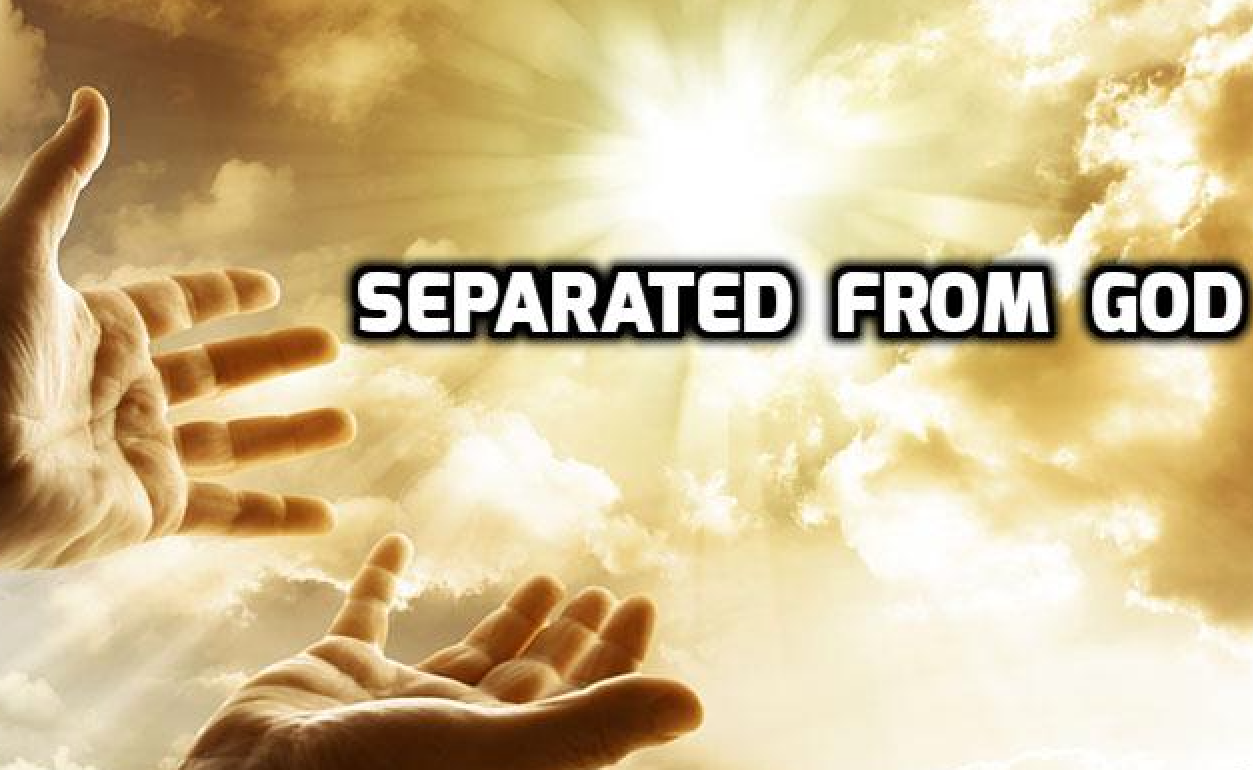
We are entering a period of deeper Christianity. God has brought us to the stage when it is the brokenness of the human heart resulting from self-separation from God that is to be faced. Each of us is being called to deepen our life of living in Jesus, seeking the face of the Father. That is the radical route to the regeneration of humanity. While each one of us has to follow the lead of the Holy Spirit in making this journey individually, all the other members of Jesus' mystical body accompany us in the communion of saints. In profound ways, they energise us, and we energise them. It is a personal, yet communal progress. On the deepest level of our being, the spiritual level, we are to become more fully our individual selves as we become more bonded with all of the other members of Christ's body. Organisers of human society assume that we have to become more cloned in order for society to work efficiently. Our Creator, however, broke the mold when he made each one of us, and he has formed us so perfectly that each of us is to sing our unique song in his great harmony of the chorus of love - just like the Trinity - in fact within the Trinity. More and more of us are to come before our Father to intercede, believing that the walls of our inner Jerichos will fall, those walls in others will also be undermined. Affairs are now soul size. He is urgently calling us to recognise our royal priesthood which requires us to intercede more profoundly. That means a greater life of prayer. God’s donkeys Prayer leads us to increasingly becoming agents of God's will wherever and however he shows it to us, which will usually take the form of fulfilling hundreds of humble tasks. It is in these that we will be purified and increasingly collaborate with him in the refining of humankind like gold. Let us not forget that our King comes riding on a donkey. Not a pretty animal, stubborn, sounding like a fog-horn, designed to pull and carry heavy loads. No one writes songs about donkeys. But there is a cross marked on its back, and for millennia it has carried our aged, infirm, pregnant mothers and precious children. It is the humble servant of the King. And how humble and cherishing our King is! We are his donkeys today, bringing him to a hungry world through offering him all our works and prayers, the “spiritual sacrifices” St Peter spoke of (1 Peter 2:5). We must never underestimate the immense power of prayer. When we open ourselves to God in prayer, we journey into his mysterious, ineffable, loving being. Our understanding fails to grasp him, but a knowing grows in our hearts. That knowing is that undefinable energy infused into us which is described by words like faith, hope and love. Faith and hope are the booster rockets of love; St Paul states that faith and hope will eventually disappear and creation will be restored in love as this age reaches its completion with the return of Christ. The Holy Spirit is the hidden agent in the Trinity, the catalyst and choreographer of this love which fills the universe. He is bringing the universe into the wholeness and holiness of the Trinity. We are his chosen collaborators. The name of this God-charged phenomenon is Church. Through his Church, God is gathering all creation into communion As people today rightly claim their freedom to take responsibility as adults, traditional communities have become fractured and new so-called ‘communities’ are springing up in social media. They are virtual and far from virtuous, lacking the richness of physical touch. But the fracturing is a preparation for the communion inspired by the Holy Spirit to become more apparent. As our hearts grow in the prayer of loving our Father, love and responsibility for others become more active and spreads, and the world itself is gradually changed. This is the dynamic we have to understand. There is a great difference between humanly organised society and natural human communities which are transformed into communion by the Holy Spirit. By natural human communities I mean such things as nations, families and friendship groups. At Easter, his people first met the risen Lord. In reality, they met themselves as well. Remember how he told Martha “ I am the resurrection and the life” (John 11. 25) ? He did not say "I will be resurrected"; he IS resurrection. It is not just Jesus who rose two thousand years ago, it is us along with all creation that are in the process of rising from the dead within his mystical body. He said: “ I am The Life” . He is among us. Humanity is increasingly being drawn into that life. That life is Church.
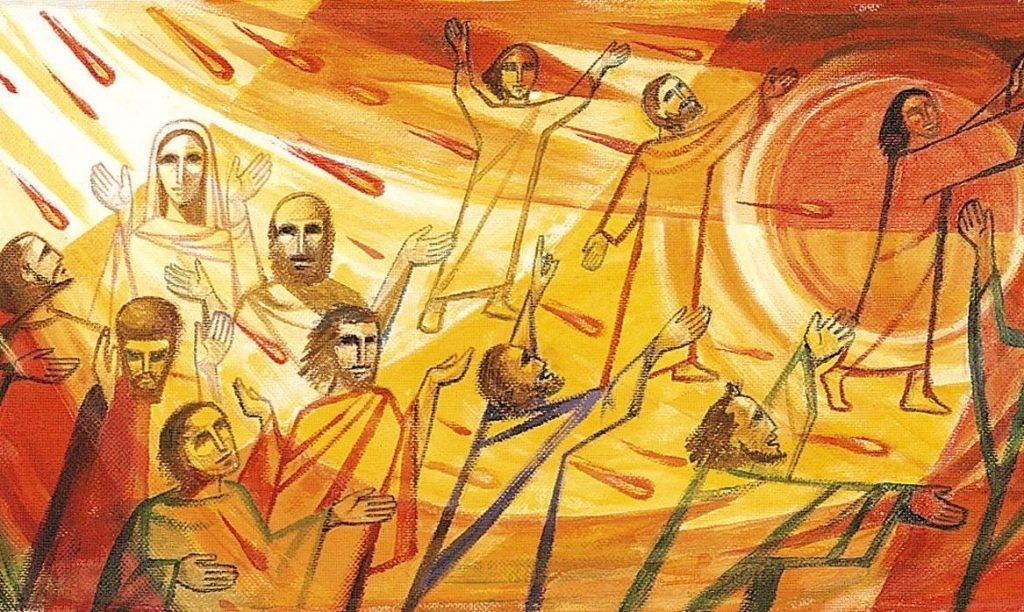
His second Body We had a Lent Course on Zoom. It turned into a series of sharings about the deep treasures of our faith. As it proceeded, it dawned on me that here was a microcosm of the Church. We were very different people with years of our own experiences behind us. Yet, as others talked, we each recognised our own experience in theirs with its hopes and graces and frustrations. Was that just a straw poll of individual Church-going Catholics, or was it the phenomenon of a master hand at work in all of us? It was the Holy Spirit working in different ways in each one of us, but producing a symphony of outcome which displays his unifying energy working in each of us. St Paul in 1 Corinthians 12: 5 tells us that it is "the same Lord; working in all sorts of different ways in different people ". What we call Church is a real, coordinated master symphony which is in fact all around us. It is the flow of God’s Spirit in human hearts and persons which is really a gigantic river moving through human history, and gradually drawing all people into itself - the second body of Christ. After the crucifixion, Jesus went in his glorified physical body into heaven only to return through the Holy Spirit. The Spirit is forming this new Mystical Body for him just as he formed his physical body in the womb of Mary. We are the parts of his mystical body. Each of us has a unique, essential function within it, and it is the Holy Spirit who coordinates this gigantic living Christ. St Paul looks forward to when this Mystical Body of Jesus will reach completion. In Ephesians 4:13, he says: “we are all to come to unity in our faith and in our knowledge of the Son of God, until we become the perfect Man, fully mature with the fullness of Christ himself”. See the Church anew We need to revise all the notions we have of what the Church is, and start to appreciate the breadth of this God-guided phenomenon which is gradually drawing all mankind into Christ. Only after that can we reassess what we have been taught about the Church. The true picture of the Church only comes into focus when we have gained a notion and sense of this vast life-force working through human history to renew mankind. God is gathering into the life of the Trinity the children of Adam and Eve. The meaning of the original Greek word for Church, “ekklesia”, is “the gathering”. The functioning of this entity, this organism, the Church, embraces all humanity, yet it is entirely personal. It really is Jesus’s new body forming through a process of gradually drawing all human beings into communion, nurtured and cherished by the Holy Spirit. And wherever the Spirit forms Christ, Mary is his partner. It is developing gradually The process isn’t finished. We are deluded if we expect it to be. Look how God worked through centuries with Israel. He is working gradually in forming the new Israel, the Church. Our impatience can blind us to this reality. Is the Church shrinking in the West? No, we are being reorganised by God in preparation for the next stage which he has planned. Is this phenomenon of Church static? No it is developing. Have we got a handle on where the Church is now being taken by God? No, future generations will be given that when they write the history of our age. This is about hope and firm belief that when the Father sent his Son, he absolutely knew what he was doing. And if we aren’t told the whole plan, we have to live with that. We aren’t meant to see it all, but to walk by faith, which Adam and Eve failed to do. Our eyes are blinkered when we see the Church as the human institution with its hierarchy. Sure, God is developing the visible organised Church organically with its rules and customs and personalities under the guidance of the Spirit, but far more important is the Mystical Body functioning in millions of brothers and sisters all over the world. The Pope, bishops, priests and nuns are important, but to focus mainly on them and Church organisation is wrong. Focus on Jesus and on all the evidence of God’s unerring determination. And focus on what we know of how he worked in the past, and you will get a sense of how he is active now. The institutional Church exists to serve the great wonder of the Spirit, forming Christ in the whole of humanity Royal priesthood Each of us is a unique and essential part of Christ's Body. St Peter says we are “living stones being built up as a spiritual house to be a holy priesthood to offer spiritual sacrifices acceptable to God through Jesus Christ” (1 Peter 2: 4-5). That means that every action and effort of yours is integrally significant in God’s plan. Nothing is outside of that process or neutral. All is contributing to the process of the gradual resurrection of humanity, or hindering it. Any prayer or action of yours now could help someone in a hundred years’ time or a hundred years ago. God is outside time and not limited by it. God allows each of his children to turn the tap to release grace into his process of salvation. Its operation does not open to scientific analysis and definitions. It is described in stories, and perceived spiritually more than intellectually. His ways are mysterious, but that does not mean that they are not perceivable. St Paul says “Only faith can guarantee the blessings that we hope for, or prove the existence of the realities that at present remain unseen” (Hebrews 11:1). It is our faith that assures us. We are like sailors filling our sails with the wind. They do not see or know all that the wind is doing, but they learn to move in it. In the soul of those who practice this way of life and prayer, he plants a sure sense that "all things work together for the good for those who love him" (Romans 8: 28). He also sends the occasional miraculous evidence that we are doing things right when we pray, or just place our lives at the service of his will, which is his determined drive for mankind’s home-coming. Contemplation and Intercession All of us are called into contemplation, which leads into prayer of intercession for our brothers and sisters. Do not underestimate the power of staying in the presence of God feeling nothing, or, worse, feeling distracted and even attacked. We say about some difficult people “their heart is in the right place”. That is how our Father sees us. He knows we are trying to pray, and that is immensely pleasing to him. What mum or dad is unmoved by a child that is doing their best? Just start, and stay there awhile, especially when it is difficult. Then is the time when it is most effective in releasing torrents of grace upon the human race. We are a combination of body and soul with minds and feelings, but at our deepest, we are spirits that have the capacity to be in love with God and all creation. If our minds are distracted or dull, and our feelings are disturbed, as long as our heart (our spirit) is set on our Father, we are in deep prayer - and effective prayer, taking up our part in this great engine which is transforming the hearts of human beings. It does demand that we build a habit of prayer. That is the narrow gate which leads to life and admits us into the regeneration of humanity from within. What of the times in our lives when we are out of our minds with cares and jobs that need doing? Is intercession impossible then? No, a simple prayer of offering it up is just as effective. A morning or evening offering covers everything. Then every effort of ours, every pain endured, every act of love, every frustration, every work for justice, every tear contributes to the great economy of saving and restoring our brothers and sisters from their hearts outward. But, for busy people, it is even more needed to make time for prayer, or they can get swamped and drown in the storms they go through. The real economy The economy is generally seen as how people exchange goods and services. It is also about how the culture which pervades these activities influences people's lives more generally, like greed/poverty, deprivation/overconsumption, exploitation/justice. It starts as considering material realities and ends up being about people’s happiness, and achieving or failing to achieve that goal. If the economy is driven only by human striving for happiness and security through material things, it is essentially defective; it must first of all be spiritual. Like all reality it is derives from God and must begin with him. All happiness is ultimately about true and balanced relationships. It starts with a relationship with God, which informs all other relationships: with our families, with what we eat, and possess, and where we live. Only after we have fallen in love with God, can we fall in love with all people and all creation. Some will say that we first need to have our needs for food, shelter and security satisfied before we can think about the things of God, but why do they have to be exclusive? You can have everything arranged nicely and still be deeply unhappy, equally, you can live in poverty and have more love and joy than the rich. A healthy economy is one in which all that is human and material is balanced by God’s grace and guidance. There is no argument for putting the first commandment, loving God, second; from it, all else flows. Look at how the struggle for trade unions and social justice started from the chapels, or universal education started from the parishes. Since they have been separated from their Christian roots, unionism has led recently in Britain to train drivers’ demands for huge rises, and doctors’ strikes shortly after they were given big pay rises. And education has become indoctrination with weird and distorted philosophies. The first commandment is to love God, and the second is to love our neighbour. It is a fundamental truth that Jesus expressed when he told us to “seek first the Kingdom of God and his righteousness, and all the rest will be added to you” (Matthew 6: 33). It is important to help people gain a vision of the real economy by which this world is being redeemed: not to see with the eyes of this world, but hear St Paul telling us: “your mind must be renewed by a spiritual revolution” (Ephesians 4:23). Your essential role You are not an insignificant second class Christian. Each of us is a firstborn in the family of God. Each of us has a unique, essential, and powerful part to play in the liberating of creation. We are each of us the children of God for whom creation has been longing (see Romans 8: 21-22). Each of us, in our own struggles, are part of the great redeeming current. All of the faithful are like an unending Mexican wave going around the world and the tide is rising. See the wonder of what you are a living part of. It is so beautiful and generous.
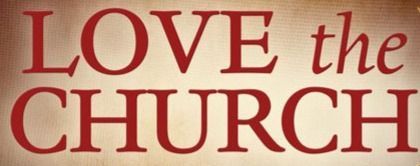
What does Church mean? The word ‘Church’ means different things to different people. For some it is a building, for others it is an organisation, for others it is the Mystical Body. Sadly, for many it is a concept, an external thing that they think about and react to in different ways. In reality it is an entity we can only appreciate properly when we see it as a life-force of which we are a member not a spectator. It can only be understood from within; it can also be sensed by "people of good will" seeking truth. Spectators often marvel at the way the Church keeps going when its members show such weakness and sinfulness. That is because they are unaware of the life-force and how it operates. It is in fact the Holy Spirit of God who enters the hearts of believers and joins them to Christ. By definition, they are sinners. The question should be not ‘why does the Church have sinful members?’ but ‘are its member generally growing in goodness’? Also you might ask ‘is the progression of the Church in the story of sinful humanity a force for good or for destruction?’ The Church’s enemies orchestrate a noisy cataloguing of the failures and vices of Church members, but they are silent about the vastly greater picture of successes, and saints, and Church organisations which have contributed to the development of humanity. We must not be silent about those great lives and achievements of holy people. Rather we should know that we are commissioned to be the latest vibrant members of this God-driven maturing of humanity. We should take to heart the way in which the Spirit has drawn so many people into the life-force of God, making them holy, and thereby more effective in improving the world. To know history is to be Catholic. What is Holiness? God is not creating some sort of Utopia on earth, as most people would understand it. He is working with humanity to bring the earth into Heaven. That is primarily about sharing his own life and holiness. ‘Holiness’ like ‘Church’ is a word which is much used, and not explained nearly enough. Again, most people think of it as a quality possessed by someone else, or some place or object, but not an inner dynamism which is developing their own hearts. This is understandable, because holiness is about being intimately connected with God which is a journey of mystery. It is through contemplation that we begin to be at home in the mystery of God's love, and that makes us increasingly aware of the Spirit working in the depths of our hearts. We pass from knowing about holiness, to experiencing it in ourselves. It is a continual process of growing in the knowing and friendship of Jesus, and going with him into the mystery of the presence of the Father. That is the dynamic which the Holy Spirit exercises in our spirits. On many diverse levels, it is at work in all people, it is the dynamic of the Church. An unexpected consequence of growing in holiness is the increased awareness that you are a sinner. All the great saints treated others as genuinely better than themselves. The Apostles addressed the early Christians as ‘saints’. We have mistakenly narrowed that word to mean only those who have stood out spectacularly as holy. That is a sadly inadequate definition of sainthood. The saint is one who is being sanctified, not just one who is already in heaven. According to the Apostles, saints are all those who have been set aside for ‘holiness’ by being brought into the holy Family of God. No wonder, Pope St. Leo the Great cries out: ‘Oh Christian, know your dignity!’ The Family of God - the Communion of Saints The Trinity is a family of blissful unity. Those who are baptised into the Family of God need to see their new birth not only as the individual process of their own journey with God, but as a family event. I have often been surprised at the warmth of welcome given to those who have been received into the Church on Easter night by members of the congregation who are perfect strangers. Instinctively, and without their thinking deeply about it, they recognise that here is one who is not a stranger. Here is a sister. Here is a brother. In many of today’s film dramas we hear the phrase ‘he’s family’, ‘she’s family’. Indeed it is often implied that this is the deepest value of humanity, and needs no explaining. Blood relationship needs no theorising; it is obvious and universally felt. Look at how adopted people often yearn to meet their biological relatives. What is not so obvious is the deep family bond within the Body of Christ, his Church. We sense this Church family bond, but seldom appreciate its deep power. The early Church had a deep sense of it. We hear it referred to frequently in the letters of the Apostles. They called each other ‘brother’ and ‘sister’. They had experience powerfully the birth of new life in the disciples and converts, and they readily recognised the Holy Spirit in each other. At the same time, they drew a great distinction between themselves and the non-believers; they were a highly motivated minority. This sense of separateness was strengthened by the belief in the first century of the Church that Christ was returning imminently, and they had to salvage as many souls as possible before the end of the world and the final judgment. The sense of family changed dramatically when Christianity was adopted as the official religion of the Roman Empire, and almost everyone joined the Church. The deep sense of Christian identity gradually shifted to being attached to a nation that recognised itself to be ‘Christian’, or an organisation they called ‘the Church’. God allowed this huge shift in the Christian sense of identity. In a way, it may have been in order to face us with the question of ‘how are all mankind involved in salvation, not just a chosen few?’ It has taken many centuries for this question to become clear. God wishes all people to be saved; that is to choose the path of journeying into God. We will only discover the answer to this great question of the salvation of all if we deepen our sense of the way the Family of God operates. The deeper ties When God the Son became human, every one of us human beings became related to him as sister or brother, and every one of us became through him a child of God the Father. Whether they were aware of it or not, this relationship with the Trinity became the primary relationship of every human being, greater than any blood relationship. That is the Good News. When people begin to experience the Good News instead of being ignorant of it, or merely aware of it theoretically, their inner selves come alive and begin to mature. And they begin to experience the vast new family of God's children The fact is that, deeper than blood ties, the spiritual ties between human beings are enormously powerful. In reality, my sins effect you, and your acts of love and goodness affect me. We will not be saved without each other. Jesus and the members of his body are on the cross until all are saved. We cannot escape this; we cannot separate ourselves from all the human family, which God desires to bring completely into the Family of the Trinity. People recognise the truth, ‘No man is an island’. Few however realise that this is not just about the social bond between human beings; it is much more really a spiritual bond. Through contemplating the loving Father, the realisation dawns that his grand design is to unite the whole of humanity spiritually as the Trinity is united. Do we not assert that in heaven we will know everyone, and be in loving communion for ever? Well, that form of eternal living is revealed as redeveloping here and now. It is the Communion of Saints. It is the Church. The real economy The earthly economy works by mutual assistance, but that is driven by self-interest. The spiritual economy, which is the far deeper project of humanity, also works by mutual assistance, but it is driven by the love of God and others. It is an indisputable fact that every one of your right acts, every travail endured for others, every sacrifice made in love, every prayer helps someone else through the economy of the Holy Spirit. Here is the real mother-load of gold for the ‘saints’ to mine. The engine for digging is contemplation, the process of refining the gold is intercession and sacrifice. That is how the Church, that jumble of sinners which so shocks us, is gradually transforming people into saints. We sinners are already operating as a Communion of Saints. Becoming the "light of the world" As we increasingly share in God’s love for everyone, we become the light for the world. Jesus prayed at the last supper to the Father: ‘may they be so completely one that the world will realize that it was you who sent me’ (John 18; 23). We rightly spend much time giving an account of our hope to the people of our age, but it is our love for God and other people that will prove to them that he has come and who he really is. Jesus tells us, in John 13:35, " By this love you have for one another, everyone will know that you are my disciples". He also revealed at the Last Supper that by our love he will be glorified when he prayed: ‘in them I am glorified’ (John 17: 10). The Martyrs of Compiegne The martyrs of Compiegne were an instance in which the glory of Jesus was dramatically witnessed in his people. Sister Gabriela of the Incarnation writes on the website, Where Peter Is : ‘These Carmelites were 16 nuns of the monastery of Compiegne in France, and when the French Revolution broke out and Catholicism was outlawed, they all vowed to offer their lives for the faith and for France. They repeated this vow each day. At first, they were allowed to live their religious life, but then they were evicted from their monastery and ordered to take off their religious habit and to cease living as religious. They broke up into small groups of 3 or 4 and lived in apartments, keeping in touch with one another and doing their utmost to live their Carmelite life as best they could. They were arrested in June 1794, and a few weeks later, on July 17, they were sent to the guillotine. They sang on the way to the scaffold, and each repeated her vows in the hands of the Prioress before she mounted the steps to the guillotine. The usually raucous, jeering crowd was totally silent as the nuns died one by one’ . Even the most degenerate person can recognise one who is full of the love of God. God is leading humanity into the fullness of love in the heart of the Trinity. That sacred pilgrimage is called the Church. How wonderful is the plan of God! All who love God, surely, must love his beautiful Church!
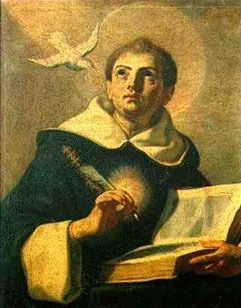
PANGE LINGUA In 1264, in response to growing demands, Pope Urban IV instituted the feast of the Sacrament of the Body and Blood of Christ, Corpus Christi. He asked St Thomas Aquinas , one of the greatest thinkers that the Church has ever produced, to compose hymns to be sung on the feast. Today we still wonder at the gift of poetry that he displayed. Among his hymns was ‘Ecce Panis Angelorum’ and ‘Pange Lingua’ which most of us are familiar with. If you do not know the Pange Lingua, you will probably know its last two verses, the Tantum Ergo, sung at Benediction. On this great feast of Corpus Christi, I take the liberty of offering my own translation of the Pange Lingua. Oh tongue of mine, sing of the Mystery of the glorious body and precious blood. This is the price paid to redeem the world. which the King pours it out upon the peoples from his generous breast, He was given to us, born to us from the immaculate Virgin. And, after living in our world and scattering the seed of his word, he climaxed his dwelling among us in this amazing way. In that greatest of suppers, celebrating with his friends, after they had eaten the Passover meal as laid down by the Old Law, from his own hands he gave himself as food to his twelve companions. The Word took our flesh; now he turns actual bread into his flesh. And (wine) is transformed into his actual blood. If our senses cannot perceive (the great Mystery), Sincere hearts are assured of it by the light of faith. Let your eyes gaze with wonder at this holy revelation of God. The Old Covenant with God is completed by this new intimacy. Let your faith perceive what your senses can not. Praise the Father, the Son and the Spirit! Do it with overflowing joy, and be blessed!
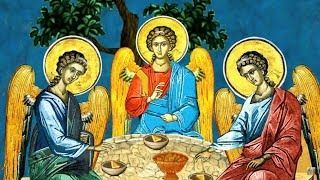
OH, THE RICHNESS!!! If you blink, you could miss some of the treasure poured out into our laps at this time. First, we are nearing the end of the Easter Season. Like Christmas, it is all too short. Personally, I am just getting into re-examining the Resurrection of Jesus – it is ending too soon! In recent years I have found myself concentrating on his passion and death, the central drama of human history, in which he fought and conquered evil. I have found such richness in the acclamation, “We proclaim his death”. I see my valiant and all-loving saviour routing, in his suffering heart, mind and body, the forces which entangle me and my world. What love! What courage! What hope! But this year it is the resurrection which is stunning me. I have been thinking a lot about the aversion of our modern minds to the whole idea of miracles. Mathematics and science base themselves on strict and unchanging laws in nature. Many philosophers today say that what seems to us to be a miracle will eventually be explained by the discovery of natural forces that we are presently unaware of. They say, if there is a God, he is primarily the law-giver, and therefore he is incapable of changing the laws that he has made. Even among ‘Christians’, there are some who say that one day we will discover the bones of Jesus somewhere in Palestine. But God is not primarily the law-giver. He is the Father who is the delight of his children. He can never be put into a box of human definition and will always surprise us. Through miraculous glimpses and disciplined formation he is re-forming us into his own likeness. On Easter morning, his Son really revived his own body as it slept in death. He not only came back to life he pulsated with the glorious new life of the new creation. I can’t get to the bottom of that – I need more time! Second, Pentecost comes quickly. There was such a supernatural commotion in Jerusalem that thousands of people flocked to the scene. What they saw was some deliriously joyful men celebrating with a big ' C' . The Holy Spirit of God, released into the world at Easter was bringing the Church to life. The Apostles are inspired, there was the miracle of everyone understanding them in their own language, and 3000 were baptised that day. I feel like spending more time here to think about God’s Spirit forming mankind into Church, bringing about the new creation here and now. I feel we only get time to remember what happened at the first Pentecost, and then are moved quickly on by the liturgy. But isn’t that desire to enter more into Pentecost as it is happening here and now precisely the work of ‘Ordinary Time’? Oh, I hope so. Third, we move onto Trinity The diet of the Liturgy seems too rich. God needed 2000 years to reveal to Israel the Mystery of the amazing love life of the three persons who are united as one God. There is no truth more deep or important. How can we just give it a day in the Liturgy? But that very deepest reality, Trinity, is what every single day is about not just Trinity Sunday. It is where we have come from, where we are now and where we are going. It is the reality in which we “live and move and have our being” (Acts 17: 28). Every day is meant to be a new stage in our exploration into the reality of our God-filled existence. A large part of the Liturgy, the big feasts, is revisiting the events of salvation, and reliving them to receive their message and know afresh the power of God. But an equally large part is just being in God and learning reality under his mighty hand. We do that by letting the Holy Spirit give us encounters with Jesus, who gradually incorporates us into himself and takes us to our Father. That is Trinity life here and now. Suddenly it’s Corpus Christi In the last paragraph I said that Jesus ‘incorporates’ us into himself in order to take us to our Father. What a surpassing mystery that he should actually do this physically when we eat his body and drink his blood! The Eucharist is the daily bread of Christians, the food for the journey. We call our last reception ‘Holy Viaticum’, the Latin for ‘food for the journey’. In that case the journey is from this world to the fully real world of the Trinity, where there will be no more days, only the eternal now, which we cannot even imagine. We only know it is eternal bliss and beautiful complete communion. The Mass is that point when millions of Christians throughout the world gather as one with all the saints of heaven and are given a foretaste of that glory which is to come. In its strength, we go out to fulfil the next stage of our task of drawing all creation into Jesus’ new life. Through repetition we learn. The great feasts we celebrate so closely together at this time, are like the headlines in a newspaper, which we scan, and later return to in order to familiarise ourselves with the details. They highlight in dazzling dramas, the everyday drama of ordinary life in Christ. It says a lot for God’s understanding of us that we spend year after year relearning so that day by day we can live more fully.

